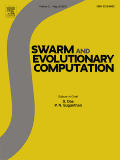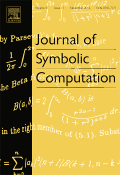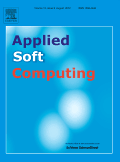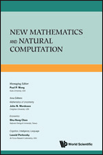
Swarm and Evolutionary Computation
metrics 2024
Unleashing Nature's Wisdom in Computational Science.
Introduction
Swarm and Evolutionary Computation is an esteemed academic journal published by Elsevier, dedicated to the exploration of innovative algorithms and methodologies derived from principles of swarm intelligence and evolutionary computation. With its ISSN 2210-6502 and E-ISSN 2210-6510, this journal has earned a prominent position in the field, evidenced by its Q1 category rankings in both Computer Science and Mathematics for 2023, reflecting its high impact and relevance. The journal's Scopus rankings further underscore its significance, placing it in the top percentile of mathematics and computer science journals. As an open-access platform, it aims to disseminate groundbreaking research that addresses real-world challenges and fosters interdisciplinary collaboration. Researchers, professionals, and students are encouraged to engage with this journal to contribute to and benefit from the ongoing advancements in swarm intelligence and evolutionary methods, which have become instrumental in solving complex optimization problems across diverse fields.
Metrics 2024
 2.27
2.27 8.20
8.20 8.40
8.40 98
98Metrics History
Rank 2024
Scopus
IF (Web Of Science)
JCI (Web Of Science)
Quartile History
Similar Journals

JOURNAL OF SYMBOLIC COMPUTATION
Bridging Theory and Practice in Symbolic ComputationThe JOURNAL OF SYMBOLIC COMPUTATION, published by Academic Press Ltd - Elsevier Science Ltd, serves as a prominent platform for researchers, professionals, and students in the field of mathematics. With an ISSN of 0747-7171 and E-ISSN of 1095-855X, this esteemed journal has been at the forefront of advancing knowledge in symbolic computation since its inception in 1985. The journal is categorized within the Q2 quartile for both Algebra and Number Theory and Computational Mathematics, reflecting its growing influence in these critical areas, as evidenced by its Scopus rankings—ranking 27 out of 119 in Algebra and 104 out of 189 in Computational Mathematics. Researchers can access a wealth of cutting-edge research articles that explore the intricacies of algorithms, algebraic models, and computational methodologies. As it converges towards its 40th anniversary in 2025, the JOURNAL OF SYMBOLIC COMPUTATION continues to be an indispensable resource for advancing theoretical and practical applications in mathematical computation.

JOURNAL OF OPTIMIZATION THEORY AND APPLICATIONS
Pioneering Insights in Theory and ApplicationJOURNAL OF OPTIMIZATION THEORY AND APPLICATIONS, published by Springer/Plenum Publishers, is a prestigious academic journal that has been at the forefront of the fields of applied mathematics, control and optimization, and management science since its inception in 1967. With an ISSN number of 0022-3239 and an E-ISSN of 1573-2878, it is recognized for its rigorous peer-reviewed content and aims to provide a platform for the dissemination of research that advances theoretical frameworks and practical applications in optimization. As of 2023, the journal holds an impressive Q1 ranking in both Applied Mathematics and Control and Optimization, showcasing its impact and influence in these domains. The journal is also highly ranked in the realm of management science and operations research, making it a vital resource for academics, professionals, and students alike. Though it does not currently offer open access, the journal's articles are widely accessible through institutional subscriptions. Significantly, its long-standing commitment to scholarly excellence positions it as a key player in fostering innovative research and discussions that impact various real-world challenges in optimization.

Evolutionary Intelligence
Fostering Innovation Through Interdisciplinary CollaborationEvolutionary Intelligence is a prestigious journal published by Springer Heidelberg, dedicated to the interdisciplinary study of Artificial Intelligence, Cognitive Neuroscience, Computer Vision, and Mathematics. With its ISSN 1864-5909 and E-ISSN 1864-5917, the journal has established a significant presence in the academic community since its inception in 2008. Spanning a diverse range of topics relevant to both theoretical and empirical research, it has achieved impressive rankings, including Q3 in Artificial Intelligence and Cognitive Neuroscience, and Q2 in Computer Vision and Pattern Recognition as of 2023. With a strong Scopus ranking that places it in the top quartiles of its field, Evolutionary Intelligence serves as an essential platform for scholars and practitioners seeking to advance knowledge and foster innovation in these dynamic fields. Researchers, professionals, and students alike will find invaluable insights and cutting-edge findings that challenge existing paradigms and inspire future explorations in intelligence-related studies.

Optimization Letters
Shaping the Future of Management and Control through OptimizationOptimization Letters, published by SPRINGER HEIDELBERG, is a leading journal dedicated to the field of optimization, serving as a platform for high-quality research that spans across mathematics, control, and management disciplines. Based in Germany, this journal has been pivotal in advancing the theory and applications of optimization since its inception in 2007, converging a wide scope of innovative methodologies and practical applications up until 2024. With an impressive Scopus ranking placing it in the Q2 category for both Business, Management and Accounting (miscellaneous) and Control and Optimization, it reflects the journal's commitment to disseminating impactful research. Researchers and practitioners benefit from the journal’s rigorous peer-review process, enhancing its credibility within the academic community. Optimization Letters invites contributions that encapsulate novel findings and methodologies that drive forward the understanding and applications of optimization, making it an invaluable resource for those in related fields.

IEEE Computational Intelligence Magazine
Innovating the Future of Artificial Intelligence ResearchIEEE Computational Intelligence Magazine, published by the esteemed IEEE-INST ELECTRICAL ELECTRONICS ENGINEERS INC, is an essential resource for researchers and professionals in the fields of Artificial Intelligence and Theoretical Computer Science. With a robust Q1 ranking in both categories for 2023, this magazine stands out as a leader in disseminating cutting-edge research and innovative applications within computational intelligence. As an invaluable conduit for knowledge, it covers a diverse range of topics, including but not limited to machine learning, neural networks, and data mining. The magazine is particularly recognized for its interdisciplinary approach, bridging gaps between theory and application while contributing to advancements in technology and society. Although it does not offer open access, the insights provided are critical for staying at the forefront of this rapidly evolving discipline. Join a community of like-minded scholars and practitioners by exploring the latest findings and trends published from 2006 to 2024, operating from its headquarters at 445 Hoes Lane, Piscataway, NJ, United States.

Memetic Computing
Pioneering Research at the Intersection of Control and OptimizationMemetic Computing is a premier academic journal published by SPRINGER HEIDELBERG, dedicated to advancing research in the interdisciplinary domains of computer science and control optimization. With an impact factor that places it in the prestigious Q1 category for both Computer Science and Control and Optimization as of 2023, Memetic Computing stands at the forefront of innovation, offering researchers, professionals, and students a vital platform to explore and disseminate transformative findings in these rapidly evolving fields. With convergence periods specified from 2009 to 2024, the journal aims to illustrate the synergy between algorithmic and natural systems, reflecting current trends and future trajectories within the scope of memetic algorithms. Its robust Scopus rankings signal its significance as an influential resource within the global academic community. This journal is invaluable for those looking to enhance their understanding and engage with cutting-edge research that blends computational theory with practical applications.

Genetic Programming and Evolvable Machines
Transforming Ideas into Intelligent SolutionsGenetic Programming and Evolvable Machines, published by SPRINGER, is a leading journal dedicated to the fields of genetic algorithms, evolutionary computation, and machine learning. With an ISSN of 1389-2576 and an E-ISSN of 1573-7632, this esteemed journal encompasses original research articles, reviews, and applications that explore the intricate relationships between intelligent systems and evolutionary processes. As of 2023, it holds a notable Q2 ranking in various categories including Computer Science Applications and Hardware and Architecture, reflecting its significant impact in advancing knowledge and methodologies within these domains. The journal's metrics, including a top rank of #31/130 in Theoretical Computer Science, signify its relevance and contribution to the broader academic community. Though not open access, papers published in the journal continue to serve as critical resources for both researchers and practitioners, promoting innovative methodologies and solutions. Covering a broad scope with a convergence extending from 2003 to 2024, this journal remains a pivotal platform for sharing cutting-edge research that shapes the future of artificial intelligence and computational theory.

APPLIED SOFT COMPUTING
Innovating solutions through soft computing applications.Applied Soft Computing is a premier international journal published by Elsevier, dedicated to advancing the field of soft computing in various applications. With an ISSN of 1568-4946 and E-ISSN of 1872-9681, it has established itself as a leading resource with a commendable impact factor and significant importance in its field. As of 2023, it ranks in the Q1 category of Software in Scopus, boasting a rank of 25 out of 407 journals in Computer Science, Software, representing the 93rd percentile among peers. The journal's primary objective is to publish high-quality, innovative research articles that explore soft computing methodologies and their applications across diverse domains, fostering interdisciplinary collaboration and advancing technological solutions. Based in the Netherlands, at Radarweg 29, 1043 NX Amsterdam, it serves as a vital platform for researchers, professionals, and students eager to contribute to and stay informed about the latest developments in soft computing.

New Mathematics and Natural Computation
Exploring the Fusion of Mathematics and Nature's LogicNew Mathematics and Natural Computation, published by World Scientific Publishing Co Pte Ltd, is a pivotal journal in the realms of applied mathematics and computational theories, catering to a diverse audience of researchers, professionals, and students. With an ISSN of 1793-0057 and E-ISSN 1793-7027, this journal serves as a critical platform for disseminating innovative research and methods that intertwine mathematical theories with natural computation processes. Operating from Singapore, it emphasizes accessibility and collaboration in advancing interdisciplinary knowledge, despite its current Q4 rankings across relevant categories such as Applied Mathematics and Human-Computer Interaction—highlighting the journal’s commitment to growth and improvement in a competitive publishing landscape. As a source of insightful findings and applications in mathematics and computer science, it invites contributors to explore the dynamic intersections between these fields and foster academic dialogue. Researchers aiming to engage with cutting-edge advancements will find this journal instrumental for their work from its inaugural issue in 2012 through its projected publications into 2024.

NETWORK-COMPUTATION IN NEURAL SYSTEMS
Decoding Neural Dynamics Through Innovative ResearchNETWORK-COMPUTATION IN NEURAL SYSTEMS is a distinguished journal published by Taylor & Francis Inc, focusing on the innovative intersection of network theory and neural computation. Since its inception in 1990, this journal has provided a vital platform for researchers and professionals in the field of neuroscience, exploring the dynamics of neural networks and computational models. With its current Q3 category ranking in Neuroscience (miscellaneous) and a robust position in Scopus, the journal plays a critical role in advancing knowledge and discussion within this interdisciplinary area. The journal addresses a wide range of topics related to the computational aspects of neural systems, fostering collaboration and providing valuable insights amongst scholars. Although it is not an open-access publication, its well-curated content remains accessible through institutional subscriptions, ensuring that significant research reaches the hands of those who need it. As it continues to evolve through 2024 and beyond, NETWORK-COMPUTATION IN NEURAL SYSTEMS stands as a key resource for anyone deeply engaged in understanding the complexities and intricacies of neural computations.